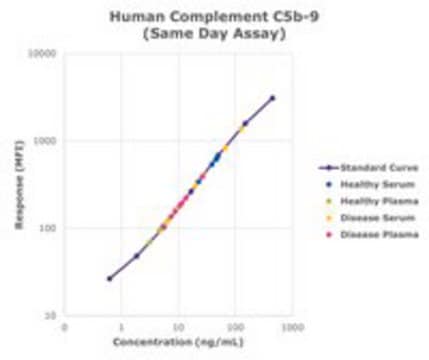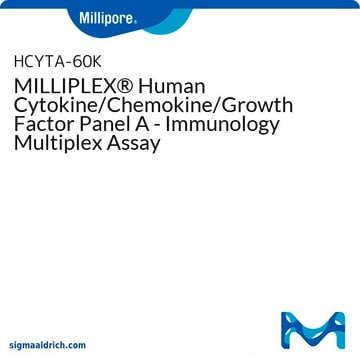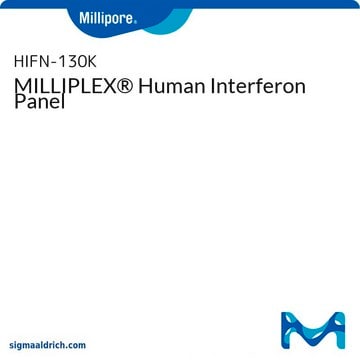HCMPEX1-19K
MILLIPLEX® Human Complement Expanded Panel 1
Sign Into View Organizational & Contract Pricing
All Photos(1)
About This Item
UNSPSC Code:
12161503
NACRES:
NA.84
Recommended Products
manufacturer/tradename
Milliplex®
Quality Level
technique(s)
multiplexing: suitable
detection method
fluorometric
shipped in
wet ice
storage temp.
2-8°C
General description
The complement system consists of a large number of plasma proteins that assist, or complement, the ability of phagocytic cells and antibodies to clear pathogens. Although it is part of the innate immune system, not adaptable and unchanging over the course of a lifetime, it can be recruited and activated by the adaptive immune system. The system proteins and glycoproteins that are synthesized primarily by hepatocytes normally circulate as inactive pro-proteins. Once stimulated the end result of the cascade is a massive amplification of response and activation of the membrane attack complex, which forms a transmembrane pore causing osmotic lysis of target cells.
The complement system consists of three different simultaneous pathways. The classical pathway is stimulated by antigen-antibody complexes; the alternative pathway spontaneously activates on contact with pathogenic cell surfaces; the mannose-binding lectin pathway recognizes mannose sugars usually present only on pathogenic cell surfaces.
The complement system is thought to play a key role in many diseases with an immune component, such as asthma or sepsis, and in many autoimmune diseases, including systemic lupus erythematosus, inflammatory bowel disease, rheumatoid arthritis, and multiple sclerosis. It is also becoming increasingly associated with neurological diseases, such as Alzheimer’s Disease, and conditions such as spinal cord injuries. The MILLIPLEX® Human Complement Expanded Panel 1 is a 9-plex kit to be used for the simultaneous quantification of any or all of the following analytes in serum, plasma, or culture supernatant samples: C2, C4b, C5, C5a, C9, Factor D (Adipsin), Factor I, Mannose-Binding Lectin (MBL), and Properdin.
The complement system consists of three different simultaneous pathways. The classical pathway is stimulated by antigen-antibody complexes; the alternative pathway spontaneously activates on contact with pathogenic cell surfaces; the mannose-binding lectin pathway recognizes mannose sugars usually present only on pathogenic cell surfaces.
The complement system is thought to play a key role in many diseases with an immune component, such as asthma or sepsis, and in many autoimmune diseases, including systemic lupus erythematosus, inflammatory bowel disease, rheumatoid arthritis, and multiple sclerosis. It is also becoming increasingly associated with neurological diseases, such as Alzheimer’s Disease, and conditions such as spinal cord injuries. The MILLIPLEX® Human Complement Expanded Panel 1 is a 9-plex kit to be used for the simultaneous quantification of any or all of the following analytes in serum, plasma, or culture supernatant samples: C2, C4b, C5, C5a, C9, Factor D (Adipsin), Factor I, Mannose-Binding Lectin (MBL), and Properdin.
Packaging
96-well plate
Legal Information
Luminex is a registered trademark of Luminex Corp
MILLIPLEX is a registered trademark of Merck KGaA, Darmstadt, Germany
xMAP is a registered trademark of Luminex Corp
Disclaimer
Unless otherwise stated in our catalog or other company documentation accompanying the product(s), our products are intended for research use only and are not to be used for any other purpose, which includes but is not limited to, unauthorized commercial uses, in vitro diagnostic uses, ex vivo or in vivo therapeutic uses or any type of consumption or application to humans or animals.
Signal Word
Danger
Hazard Statements
Precautionary Statements
Hazard Classifications
Acute Tox. 4 Dermal - Acute Tox. 4 Inhalation - Acute Tox. 4 Oral - Aquatic Chronic 2 - Eye Dam. 1 - Skin Sens. 1 - STOT RE 2
Target Organs
Respiratory Tract
Storage Class Code
10 - Combustible liquids
Certificates of Analysis (COA)
Search for Certificates of Analysis (COA) by entering the products Lot/Batch Number. Lot and Batch Numbers can be found on a product’s label following the words ‘Lot’ or ‘Batch’.
Already Own This Product?
Find documentation for the products that you have recently purchased in the Document Library.
Our team of scientists has experience in all areas of research including Life Science, Material Science, Chemical Synthesis, Chromatography, Analytical and many others.
Contact Technical Service












